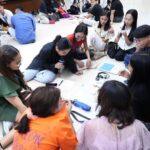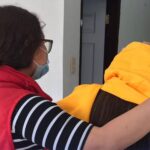In continuation of the efforts to streamline the agency’s provision of programs and services, the Department of Social Welfare and Development’s (DSWD) management committee (MANCOM) conditionally approved four proposed guidelines to bolster the implementation of Republic Act No. 11032 or the Ease of Doing Business and Efficient Government Service Delivery Act.
The proposed guidelines were presented by Director Wayne Belizar of the DSWD Management Service (MS), who also serves as the head of the Committee on Anti-Red Tape (CART) Secretariat, during the MANCOM’s 8th regular meeting on Tuesday (May 13) at the agency’s Central Office in Quezon City.
The proposed guidelines were the Framework for Implementing the Program Service Delivery Improvement Plan (PSDIP) in DSWD: Towards Standardized and Efficient Service Delivery; DSWD Zero Backlog Policy; Guidelines on the DSWD Report Card Survey; and the Guidelines on the Implementation of Three (3) Signatories Rule under Section 9 (D) of Republic Act No. 11032.
“It is very clear that we are introducing the Program Service Delivery Improvement Plan in order to ensure that the Department’s efforts in service delivery and improvement are not only planned, kundi budgeted din ito, implemented and monitored,” Director Belizar said as he explained the significance of the PSDIP in removing bureaucratic red tape and promoting positive client experience.
Aside from improvements in the EODB implementation, Director Maria Isabel Lanada of the DSWD’s Disaster Response Management Bureau (DRMB) also made a final presentation on the summary of recommendations to the proposed Guidelines on the Implementation of LAWA (Local Adaptation to Water Access) and BINHI (Breaking Insufficiency through Nutritious Harvest for the Impoverished).
“The target of the LAWA and BINHI from the loose formation ng mga partner beneficiaries is we would like them to organize themselves into CBOs (community-based organizations) in the year 3…and then yung collaboration for advancing food security is more on ensuring na yung ating convergence and yung mapping ng ating mga areas and partner beneficiaries is gearing towards food security,” Director Lanada pointed out in her presentation.
The proposed guidelines for the LAWA and BINHI were also ruled conditionally-approved by the MANCOM and will be subjected to consideration of MANCOM inputs and recommendations before securing the committee’s full approval and endorsement to the executive committee (EXECOM) level.
Deputy Program Manager (DPM) Marilyn Moral of the Pag-Abot Program, on the other hand, discussed the proposed amendments to Memorandum Circular No. 7, S. 2024, as amended, or the Institutionalization of Pag-abot Program for Children, Individuals, and Families in Street Situations.
The Pag-Abot DPM said that they are preparing to include provisions for independent living arrangements for the program’s clients to de-clog the DSWD’s care facilities.
“We know for a fact that our care facilities ay marami ng [kliyente]…so we thought of coming up with an independent living arrangement for those capable individuals and families. Ito yung nakikita namin na parang group home pero ang target namin ay those who are employable pa, capable pa, but no receiving family at the moment,” DPM Moral said.
DPM Moral further explained that as much as they want to reintegrate all clients to their places of origin, they are having challenges because some receiving families are also experiencing difficulties of their own.
The DSWD MANCOM, composed of assistant secretaries and directors, is a consultative body to institute closely coordinated work among bureaus and service units, which also undertakes a complete review and integration of input for proposed guidelines, position papers, policies, issuances, and other policy instruments. # (AKDL)


